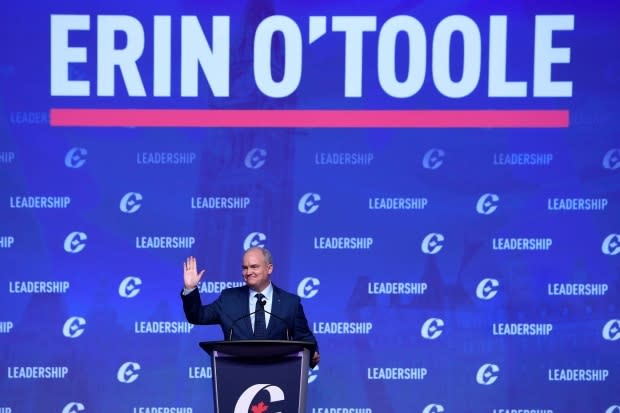To win the Conservative leadership, Erin O'Toole needs to be what he wasn't in 2017
Erin O'Toole is spending the first days of his campaign for the Conservative Party leadership in Western Canada, far from the Greater Toronto Area riding he represents.
In doing so, he sets up a not-so-subtle contrast with Peter MacKay's decision to launch his own campaign in Nova Scotia, where he sat as an MP for 18 years. And it isn't the only point of contrast O'Toole will need to draw with MacKay in order to have a shot at winning.
MacKay begins this leadership campaign as the odds-on favourite. He is already surging ahead in caucus endorsements, getting the nod from MPs who supported candidates from across the spectrum in the 2017 leadership race — including those who threw their weight behind O'Toole three years ago.
As a Nova Scotian and the last leader of the federal Progressive Conservatives, MacKay is seen as representing the more moderate wing of the party — the largely Atlantic rump that was folded into the modern Conservative Party when MacKay merged his PCs with the Canadian Alliance in 2003.
The leadership race now lacks a high-profile candidate from Western Canada — a void that O'Toole apparently is trying to fill. It's no accident that O'Toole launched his campaign on Monday while touring Alberta.
But the space to the ideological right of MacKay is also waiting to be occupied. The question for O'Toole is whether an Ontario MP seen as a moderate by members in 2017 will be able to fill both of these vacuums in 2020.
Can O'Toole be the West's candidate?
Durham, a riding to the east of Toronto at the edge of the city's suburban belt, is some 1,500 kilometres away from the Manitoba border. An MP representing the riding has some work to do to be seen as Western Canada's candidate.
But the biography included in the press release announcing O'Toole's candidacy described a man from everywhere: O'Toole's stints living in Montreal, Winnipeg, Halifax, Bowmanville, Ont. and Chilliwack, B.C. were all mentioned.
O'Toole's attempts at wooing Western Canadians in 2017 did not prove successful. On the first ballot of that race, he finished third in British Columbia (12.5 per cent) and Alberta (10 per cent), fourth in Manitoba (14 per cent) and fifth in Saskatchewan (seven per cent).

In the 12th round (after which O'Toole was eliminated) he had just 24 per cent support in B.C., 23 per cent in Manitoba, 17 per cent in Alberta and 11 per cent in Saskatchewan. He had better scores in Ontario and Atlantic Canada.
His donor base was disproportionately located in Ontario, where 76 per cent of his fundraising originated. He raised just 19 per cent of his money from Western Canada — but 37 per cent of all the money raised by all candidates in the race came from Western Canada. He ranked seventh in fundraising in the region, placing behind front-runners Maxime Bernier and Andrew Scheer and also Kevin O'Leary, Kellie Leitch, Andrew Saxton and Brad Trost.
Scheer, as a Saskatchewan MP, represented something that the current race does not yet have: a major candidate from Western Canada. But that should have posed the same obstacle to other non-Westerners, like Bernier, O'Leary and Leitch, as it did to O'Toole.
Can O'Toole be the right's candidate?
Of course, the importance of a candidate's home region only goes so far. Bernier topped the first ballot in his own province of Quebec and also in Alberta, B.C. and Ontario, where there were local contenders.
If O'Toole doesn't have a clear path to victory to the left of MacKay, that only leaves him the right. His campaign slogans — "True Blue Leadership" in English and "Un Vrai Bleu (A True Blue)" in French — suggest that this is his strategy, as they imply his opponents are not as conservative as he is.
But does the shoe fit for O'Toole?
In 2017, party members did not see O'Toole as a right-wing candidate. When Michael Chong (a moderate who advocated for a carbon tax — and got booed by CPC members in the process) was eliminated from the ballot, 58 per cent of his points went to O'Toole — nearly three times as much as went to Bernier or Scheer.
O'Toole also was the biggest beneficiary when Lisa Raitt (another moderate) was eliminated. But when Leitch (an advocate for a hard line on immigration) and Trost (a social conservative) dropped off the ballot, both Bernier and Scheer received more of their support than O'Toole did.
Some of the other candidates who have declared undoubtedly will make a play for the right as well. Ontario MP Marilyn Gladu has laid out an approach to social issues that's similar to what existed under previous leaders, while a number of social conservatives are trying to position themselves as the standard bearer for that segment of the membership.
That competition only compounds the challenge for O'Toole. There is a path to victory for a candidate who represents everything that MacKay is not — someone who can appeal to Westerners and rock-ribbed Conservatives. The early indications are that O'Toole is trying to be that candidate — but it means being something that he wasn't just three years ago.

